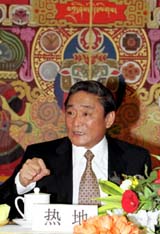

 |
 |
 |
 |
 |
 |
 |
 |
 |
 | ||||||||
| |||||||||
| Friday, March 10, 2000, updated at 14:10(GMT+8) China Tibet to Seize Opportunity for Speeded Development
A top law-maker in Tibet March 9 said that as 2000 is the first year to implement the strategy on large-scale development of China's western region, Tibet will seize the historical opportunity to speed economic and social growth in the highland region. Addressing a press conference at the on-going session of the 9 th National People's Congress (NPC), Raidi, a NPC deputy and chairman of the NPC Standing Committee, said he has personally witnessed social progress, unity between ethnic groups and people's contented life and work during the past year. On the development in the autonomous region, Raidi said that in 1999 the GDP in Tibet was 10.335 billion yuan, rising 9.1 percent over the previous year. The growth rate of the region has exceeded the national average level for six consecutive years. Tibet reported the 12th bumper harvest in 1999 with its grain output amounting to 917,000 tons. It has basically achieved self- sufficiency in grain supply. Meanwhile, it made progress in regulating industrial structure and developed a batch of brand-new and high-quality products which sell well on markets. And the industrial output value of the region rose 7.8 percent last year over 1998. More than 448,000 overseas and domestic tourists visited Tibet last year with tourist receipts of 36 million U.S. dollars, up 15. 6 and 13.5 percent over 1998 respectively. People's life in Tibet was further improved and the annual income of farmers and herdsmen reached 1,250 yuan per-capita, an increase of 7.9 percent. The average per-capita disposable income of urban residents reached 5,907 yuan, up 8.6 percent. Progress was also made in the fields of education and culture services, Raidi said. And the people's legal right and interests and the freedom of their religious belief are fully guaranteed. There are 1,700 religious sites such as temples and lamaseries. On Living Buddha Karmapa's (Garmaba) leaving, Raidi said that with the approval of the Bureau of Religious Affairs of the State Council, the 17th Karmapa was enthroned in the Tsurphu Monastery near Lhasa, capital of the Tibet Autonomous Region, in 1992. Both the central government and Tibetan regional government showed kind attention to Karmapa, particularly his education and upbringing, and many special tours were arranged for him to visit interior areas and all over the Tibet, he said. "We provided him with fairly good environment for his study and daily life in Tsurphu Monastery," Raidi said. Without any restriction to religious activities, there are lots of religious services every year in Tsurphu Monastery, he added. Moreover, the government specially assigned people to maintain order in the monastery in a bid to ensure smooth religious services, and all this shows the Party's religious policy was correct and authentic. "Karmapa and his men left the monastery not long ago. Upon their leaving, he left a letter which I had seen," Raidi said. Karmapa's letter says that he will not betray the state and nation, the leaders and the temple. In reply to a question whether Karmapa's leaving has something to do with the Dalai clique, Raidi said the clique and some overseas forces always attempted to control and make use of Karmapa with their ulterior motives harbored to split the motherland. "We are against any person who makes use of Karmapa issue to engage in any political activities in any form to oppose China," he said. Some overseas news reports say recently that after Karmapa's leaving, his parents and lamas in the monastery were detained. " That is groundless," said Raidi, "his parents said they are grateful to the Party and governments' kind attention shown to Karmapa in the past years." "His parents are leading a happy life. And the order of Tsurphu Monastery is normal," he said. On the negotiation channel between the Chinese government and Dalai Lama, Raidi said the relations between the Chinese government and Dalai Lama represent China's internal affair and the negotiation channel remains unimpeded. The Central government's policy toward Dalai Lama has been consistent. Dalai Lama must abandoned his position on Tibet Independence and halt all activities aimed at splitting the motherland, openly claims that Tibet is part of the People's Republic of China (PRC), Taiwan is one province of China, and PRC is the sole and legitimate government to represent the whole of China. On the so-called reincarnation of Panchen Lama chosen by Dalai Lama, Raidi said that on May 14, 1995, Dalai Lama, in violation of religious practices and rites and willfully announced the reincarnation of Panchen Lama, which the Chinese government immediately declared as unlawful and invalid. "The child is no incarnation of Panchen, but an ordinary boy. He is now studying at primary school, where He does quite well in class and he is happy." On the impact of amending the Law on Autonomy of Minority Ethnic Regions, he said this represents important part of China's political system and it is a basic policy to settle ethnical issue, which conforms to the reality of Tibet and it has promoted economic development in Tibet. With sustained social development and establishment of socialist market economy, the law should be amended appropriately, with only a few improvements, to the benefit of economic and social development in the regions of ethnic groups. Printer-friendly VersionBack to top |
 Relevant Stories  Internet Links |